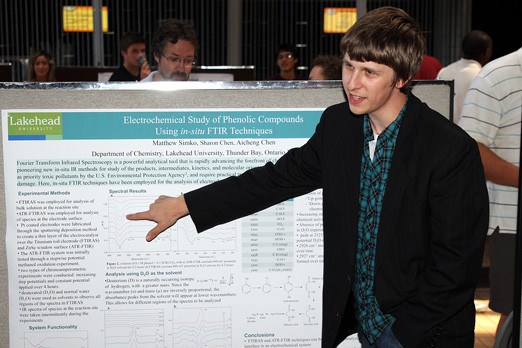Matthew Simko is looking for every advantage he can find when he hits the job market.
A concurrent education and chemistry student at Lakehead University, Simko has spent the summer in the lab, working for the university and gaining valuable experience at the same time.
He was on hand Thursday for the International Year of Chemistry 2011 student summer research on display event, which featured the work of him and 13 of his fellow students, who have been looking into subjects as wide and varied as inorganic materials, computational chemistry and organic synthesis.
Simko said his experiments in electrochemistry were a way for him to get his feet wet in the research field and see what it takes to make a difference, make progression in his work and discover new and exciting innovations. His project looked specifically at ways of keeping toxins out of local waterways.
"There’s a lot of wastewater from industry, things like pesticides and such. What I’m doing specifically is using a technology called spectroscopy and I’m analyzing the site of where the reactions are occurring," he said.
"We’re trying to break down these chemicals basically using electricity. The technique allows us to see specifically what’s going on at that site, so we can find new and different ways to break down these hazardous compounds."
Having a chance to get hands-on-experience is invaluable, Simko added.
"It’s a huge advantage. When you want to go on and pursue chemistry research as a future, this is essential. You get to see what it take to do the experiments, do trials and go through researching the material and processing publications," Simko said.
"It’s a huge advantage. I feel like I’ve learned so much from participating in the program here the past two summers."
And it beats the alternative, working in a fast-food restaurant, he said.
"For sure."
Christine Gottardo, chairwoman of the chemistry department at Lakehead, said the program is win-win for the school and the students, particularly the latter.
"They can work with a supervisor to do their own research projects and it gives them more real world experience than the undergraduate labs they take through their courses," she said.
The school is already reaping some of the benefits from the program’s successful past.
"If you look at some of stuff that has come out of (one) lab (they) have been involved in cement work and finding a new way to make cement that sets and is more energy-efficient and cost-efficient to repair," she said.
Thursday’s poster session at the Agora was a way to showcase the work of all 14 students.
